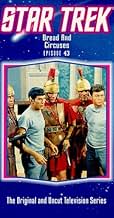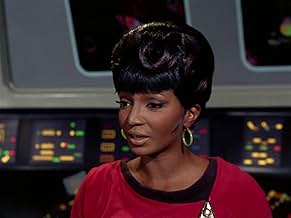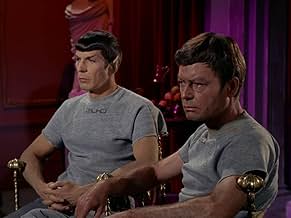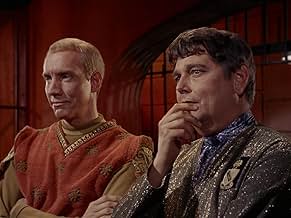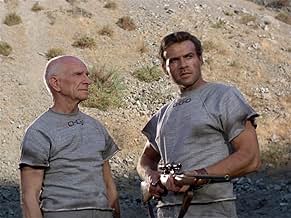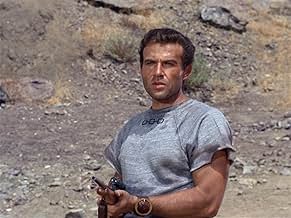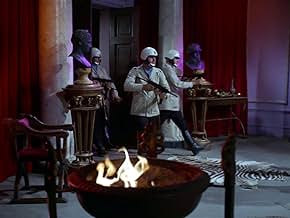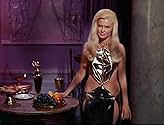Bread and Circuses
- Episode aired Mar 15, 1968
- TV-PG
- 50m
IMDb RATING
7.0/10
3.7K
YOUR RATING
The Enterprise crew investigates the disappearance of a ship's crew on a planet that is a modern version of the Roman Empire.The Enterprise crew investigates the disappearance of a ship's crew on a planet that is a modern version of the Roman Empire.The Enterprise crew investigates the disappearance of a ship's crew on a planet that is a modern version of the Roman Empire.
- Director
- Writers
- Stars
Bart La Rue
- Announcer
- (as Bart Larue)
Paul Baxley
- Policeman #1
- (uncredited)
Bill Blackburn
- Lieutenant Hadley
- (uncredited)
Frank da Vinci
- Lt. Brent
- (uncredited)
- Director
- Writers
- All cast & crew
- Production, box office & more at IMDbPro
7.03.7K
1
2
3
4
5
6
7
8
9
10
Featured reviews
Parallel Earth overrun perhaps, but one of the best and with great moments
I don't get at all how this one has a rating in the 6's!!
Yes, it's another of the budget-saving Parallel Earth type episodes..... And maybe since this one comes AFTER so many of the other Parallel Earth episodes, and so many in a row, that this episode draws the brunt of the reviewers frustration with so many of the Parallel stories.....
And that's not an invalid view, but it's just that aside from the overrun with such stories, this one really is packed with good moments! From Scotty on the bridge, and Spock and McCoy in the arena and banter throughout, and the 60's TV production satire, and Uhura getting the surprise ending that actually worked better than most Star Trek attempts at such!
And, seriously, the reviews here down-rating this for the ending or the religious/God content...... Those are very misguided! One does not have to agree with the religion to still appreciate this as a great STORY!
Yes, it's another of the budget-saving Parallel Earth type episodes..... And maybe since this one comes AFTER so many of the other Parallel Earth episodes, and so many in a row, that this episode draws the brunt of the reviewers frustration with so many of the Parallel stories.....
And that's not an invalid view, but it's just that aside from the overrun with such stories, this one really is packed with good moments! From Scotty on the bridge, and Spock and McCoy in the arena and banter throughout, and the 60's TV production satire, and Uhura getting the surprise ending that actually worked better than most Star Trek attempts at such!
And, seriously, the reviews here down-rating this for the ending or the religious/God content...... Those are very misguided! One does not have to agree with the religion to still appreciate this as a great STORY!
"It's not the sun up in the sky. It's the ..."
Communication's officer Lieutenant Uhura sums up the decline and fall of the Roman Empire as the world knows it. The plot is really secondary. It's there to drive the story forward, but the underlying theme tells of the human condition via a reign of pure strength, and its ultimate failure.
This theme is reinforced by one of the supporting characters, an escaped 20th century Roman gladiator, Flavius, and his ultimate sacrifice. He represents the old way, once reformed, but gone back to the rule of Rome by fighting the Romans the only way he knows how.
The basic story is a rescue mission, but the real story is the heartfelt examination of the futility of a society that relies on a slave class to sustain itself on all levels, even down to bloody gladiatorial games as entertainment. Kirk is put through the rigors of experiencing both the pains and pleasures of such a society, and although he understands that he cannot change this world, he does help reinforce the message that will ultimately alter it and its Roman Empire on the most fundamental level.
Note Kirk's line as he talks to Flavius in the cave and pats him on the shoulder. Attach that to Uhura's summation at the end, and you got yourself the entire story: "It's not the sun up in the sky. It's the ..."
Positives; Kirk scores with a hot blonde. Druscilla is a HOTTIE! At least she was in 1967 :-) If I were the captain of the Enterprise I think I would bend the rules a little and beam her up to the ship before breaking orbit. Heck... I'd deserve it! The production values in this episode are also top notch. Largely because we're not dealing with aliens and spaceships here, but a historical retrofit to then modern times.
Excellent social commentary on not only a personal spiritual level, but also on the imperial nature of unbridled profit.
Enjoy.
This theme is reinforced by one of the supporting characters, an escaped 20th century Roman gladiator, Flavius, and his ultimate sacrifice. He represents the old way, once reformed, but gone back to the rule of Rome by fighting the Romans the only way he knows how.
The basic story is a rescue mission, but the real story is the heartfelt examination of the futility of a society that relies on a slave class to sustain itself on all levels, even down to bloody gladiatorial games as entertainment. Kirk is put through the rigors of experiencing both the pains and pleasures of such a society, and although he understands that he cannot change this world, he does help reinforce the message that will ultimately alter it and its Roman Empire on the most fundamental level.
Note Kirk's line as he talks to Flavius in the cave and pats him on the shoulder. Attach that to Uhura's summation at the end, and you got yourself the entire story: "It's not the sun up in the sky. It's the ..."
Positives; Kirk scores with a hot blonde. Druscilla is a HOTTIE! At least she was in 1967 :-) If I were the captain of the Enterprise I think I would bend the rules a little and beam her up to the ship before breaking orbit. Heck... I'd deserve it! The production values in this episode are also top notch. Largely because we're not dealing with aliens and spaceships here, but a historical retrofit to then modern times.
Excellent social commentary on not only a personal spiritual level, but also on the imperial nature of unbridled profit.
Enjoy.
Trek guys roman all over history
This was a pretty cool episode. It followed the tried and true formula of going back into what essentially is an exploration of earth's history. The Romans are more like Nazis but it works pretty well. I was surprised while watching this one last night that I didn't recall ever having seen it before, at least not all of it. This doesn't rate as a classic offering of the first Trek series but it was interesting and fun. The guys encounter an alien society that has patterned itself after ancient Rome, complete with televised gladiator battles to the death. Spock gets a chance to display his nifty swordsmanship while McCoy shows why hes a doctor, not a gladiator(although he does whack one dude with a mean karate chop during a jail escape). Spock has to endure a chopping lecture about being human from McCoy as well. Lots of McCoy in this one kids. Overall, this is not one of the very best episodes but still a ton of fun. Hey, you actually get to see the crew dice up some bad guys with swords at the end. This is absolutely one of the most violent Treks. By far!!!!! Also, Kirk gets to bed down with a sizzling hot slave girl due to the Romans respect for the Captain's "manliness". You go Kirk....little wonder the Captain was smiling on the bridge at the end of this one!!!! Whoa
Slavery evolving into an institution
Kirk, Spock and McCoy visit a planet mirroring the Roman Empire of Earth.
This is an enjoyable but unoriginal episode with some good character moments.
The plot is mostly uninspired as we see yet another Federation character breaking the Prime Directive in a similar way to 'Patterns of Force' and 'The Omega Glory'. I prefer this one to both of the above, but the source of the Roman cultural imitation is not explained, much like the situation on Omega IV. Though, I do like the themes regarding slavery and the role of the entertainment industry to help curtail civil unrest.
The character interactions are good, with the central three having some strong exchanges, particularly Spock and McCoy.
The guest characters are mostly solid, particularly Claudius and Flavius, played well by Logan Ramsey and Rhodes Reason respectively. I enjoyed the scene with Drusilla who suitably entertains Kirk, distracting him from the plight of his two friends.
Where it falls down cinematically is the gladiatorial fights. Not only are they cheaply staged, but poorly choreographed. It looks suspiciously like a one-take rush job. Aside from this the visuals are reasonably good.
William Shatner, Leonard Nimoy, and DeForest Kelley are on good form. It's also nice to see Nichelle Nichols chipping in briefly towards the end, but as always she is underused.
This is an enjoyable but unoriginal episode with some good character moments.
The plot is mostly uninspired as we see yet another Federation character breaking the Prime Directive in a similar way to 'Patterns of Force' and 'The Omega Glory'. I prefer this one to both of the above, but the source of the Roman cultural imitation is not explained, much like the situation on Omega IV. Though, I do like the themes regarding slavery and the role of the entertainment industry to help curtail civil unrest.
The character interactions are good, with the central three having some strong exchanges, particularly Spock and McCoy.
The guest characters are mostly solid, particularly Claudius and Flavius, played well by Logan Ramsey and Rhodes Reason respectively. I enjoyed the scene with Drusilla who suitably entertains Kirk, distracting him from the plight of his two friends.
Where it falls down cinematically is the gladiatorial fights. Not only are they cheaply staged, but poorly choreographed. It looks suspiciously like a one-take rush job. Aside from this the visuals are reasonably good.
William Shatner, Leonard Nimoy, and DeForest Kelley are on good form. It's also nice to see Nichelle Nichols chipping in briefly towards the end, but as always she is underused.
When in Rome.....
Kirk, Spock, and Bones beam down to a planet because it is quite possible that the survivors of a space catastrophe have ended up there. They find that the society of this planet is modeled after ancient Rome - complete with gladiators and slaves - except that it's been given a 20th century twist. (These people are fond of television.) Our trio of heroes are going to end up participating in the "games" before there is any chance of escape.
By this point, it was clear that the series was in something of a rut, with too many stories set in representations of moments in Earth history, and too many stories in which the Prime Directive is broken. A former associate of Kirks' is involved, a man named Merik (William Smithers, "Papillon"), but he's not the true villain; rather he's a weak character dominated by a man named Claudius (Logan Ramsey, "Walking Tall"), who comes to respect Kirk but who is still determined to see him die for his defiance.
I do understand Roddenberry's following of a formula, as it allowed him to examine various social & political facets of our own history through the funnel of a science-fiction series. It just comes as disappointing if one is hoping for more tales of a cosmic nature. Certainly the tales are provocative, however, and do get us talking about them afterwards.
There are pleasures to be had, of course: the ongoing arguments between Spock & Bones (including a dramatic moment where Bones believes he's gotten to the heart of Spocks' character), the sight of Spock & Bones carrying swords & shields, Kirk romancing yet another woman (gorgeous blonde Lois Jewell), and appearances by two other top character actors: Ian Wolfe ("Witness for the Prosecution") and Rhodes Reason ('White Hunter').
Even though these kinds of episodes do tend to get repetitive, they're always "interesting" in the way that they hold a mirror up to our own lives - if not "fascinating".
Seven out of 10.
By this point, it was clear that the series was in something of a rut, with too many stories set in representations of moments in Earth history, and too many stories in which the Prime Directive is broken. A former associate of Kirks' is involved, a man named Merik (William Smithers, "Papillon"), but he's not the true villain; rather he's a weak character dominated by a man named Claudius (Logan Ramsey, "Walking Tall"), who comes to respect Kirk but who is still determined to see him die for his defiance.
I do understand Roddenberry's following of a formula, as it allowed him to examine various social & political facets of our own history through the funnel of a science-fiction series. It just comes as disappointing if one is hoping for more tales of a cosmic nature. Certainly the tales are provocative, however, and do get us talking about them afterwards.
There are pleasures to be had, of course: the ongoing arguments between Spock & Bones (including a dramatic moment where Bones believes he's gotten to the heart of Spocks' character), the sight of Spock & Bones carrying swords & shields, Kirk romancing yet another woman (gorgeous blonde Lois Jewell), and appearances by two other top character actors: Ian Wolfe ("Witness for the Prosecution") and Rhodes Reason ('White Hunter').
Even though these kinds of episodes do tend to get repetitive, they're always "interesting" in the way that they hold a mirror up to our own lives - if not "fascinating".
Seven out of 10.
Did you know
- TriviaThe caves where the Children of the Sun hide out are one of the most-used locations in television and movies. In addition to being the entrance to Batman (1966)'s Batcave, they are also seen in Invasion of the Body Snatchers, Kung Fu (1972) and various police and western shows. They are located right below the famous Hollywood sign.
- GoofsDr. McCoy says ancient Romans were not sun worshipers. Several Roman religions included solar deities, including Apollo, Mithra, and Sol Invictus.
- Quotes
Dr. McCoy: You know why you're not afraid to die, Spock? You're more afraid of living. Each day you stay alive is just one more day you might slip, and let your Human half peek out. That's it, isn't it? Insecurity. Why, you wouldn't know what to do with a genuine, warm, decent feeling.
Spock: Really, Doctor?
Dr. McCoy: [after a pause] I know. I'm worried about Jim, too.
- Alternate versionsSpecial Enhanced version Digitally Remastered with new exterior shots and remade opening theme song
- ConnectionsFeatured in Star Trek Logs: An MTV Big Picture Special Edition (1991)
Details
- Release date
- Country of origin
- Official sites
- Language
- Filming locations
- Production companies
- See more company credits at IMDbPro
Contribute to this page
Suggest an edit or add missing content

